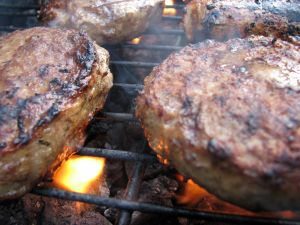Dramatically reducing emissions of one of the key contributors to global warming – nitrous oxide – will require farmers to change their ways of growing food, and citizens in the developed world to slash their yearly meat consumption, according to a new study published Friday.
The study by Eric Davidson, the director of the Woods Hole Research Center on Cape Cod, Mass., lays out actions that would be required in order to adhere to emissions scenarios developed by the U.N. Intergovernmental Panel on Climate Change (IPCC).
Specifically, meeting the strictest emissions reduction scenario would mean that, in the developed world, the average person would need to cut their meat consumption in half by the year 2050. This would help ensure there would be enough food to feed the planet’s rising population, with nearly 9 billion people expected to call Earth home by 2050, up from about 7 billion today. Red meat consumption is growing in the developing world and is still on the increase in developed countries, trends that pose formidable obstacles to those seeking to reign in nitrous oxide emissions.
Nitrous oxide is a potent greenhouse gas that, along with other more abundant greenhouse gases such as carbon dioxide and methane, is warming the climate. In other forms, nitrogen is also a major pollutant responsible for fouling waterways, such as the Chesapeake Bay and Gulf of Mexico, where excess nitrogen runoff from agricultural areas can create low oxygen “dead zones” unsuitable for marine life. More than 80 percent of manmade nitrous oxide emissions come from the agricultural sector, the study states.
Because nitrogen-based fertilizers are such an essential part of modern food production and the global population is growing rapidly, reducing emissions of nitrous oxide is tricky.
Davidson said nitrous oxide emissions could be cut by improving how we manage fertilizers and manure, employing proven techniques such as planting winter cover crops, altering livestock nutrition, and more controversially, by reducing per capita meat consumption in the developed world.
A decline in meat consumption would have two main benefits, Davidson said. It would reduce the demand for nitrogen-based fertilizers, and cut down on manure production and use.
As for whether a 50 percent reduction in average per capita meat consumption is at all feasible by 2050, Davidson pointed to the relatively rapid changes in cigarette smoking habits seen during the past 50 years.
“If you had asked me 30 years ago if smoking would be banned in bars I would have laughed and said that would be impossible in my lifetime, and yet it has come true,” Davidson said in a press release.
“I don’t have an expertise to say how likely it is that people will change habits,” he said in a phone interview, emphasizing that he is not advocating vegetarianism, but rather is pointing out that in order to reach certain emissions reduction goals, cutting meat consumption in the developed world has to be considered as a sensible option.
The study notes that if people were to take an intermediate step and switch some meat consumption from red meat to pork, poultry or shellfish, they would help reduce nitrous oxide emissions.
This article was originally published on Climate Central – www.climatecentral.org. Reproduced with permission.










